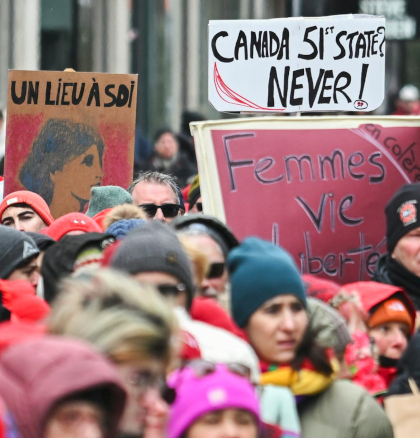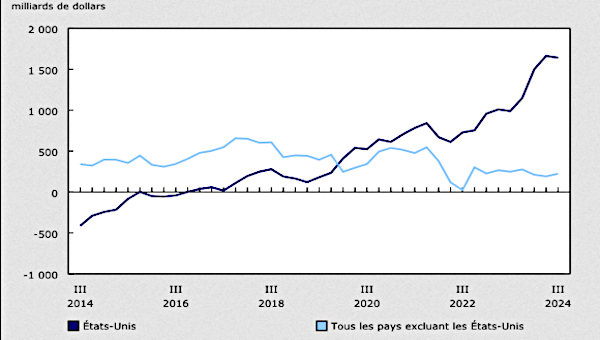Facing Trump: What Perspectives for Quebec’s Ecosocialist and Ecofeminist Left?
The new era is characterised by far-right parties taking power in different parts of the world, including Donald Trump’s party in the United States. This situation poses a series of challenges to the ecosocialist and ecofeminist left and to the political and social left as a whole worldwide, in Canada and in Quebec.
Québec solidaire also faces these challenges and must develop a programme, strategies, and actions to address them. To do this, it is important that a broad debate opens up within the political and social left, particularly within Québec solidaire.

A. The New Political Situation and the Foundations for an Ecosocialist Orientation
One of the essential elements of the current political situation is Trump’s victory and the new directives he is proposing: a) threats to appropriate Greenland and the Panama Canal through military intervention; b) the multiplication of tariffs against China and against allies, such as Europe and Canada; c) the defence of fossil fuels, thereby contributing to the deepening climate crisis; d) a generalised offensive against the welfare state and the working and popular classes of the United States and all imperialist countries; e) measures favouring the concentration of wealth and the dismantling of public services; f) support for far-right parties around the world; g) the consolidation of policies of predation of natural resources to the point of radically challenging international relations marked by law; h) the militarisation of economies and preparation for wars with competing imperialist powers.
As Romaric Godin writes: “Let us be clear: the United States does not become imperialist with Trump, but this imperialism changes in nature. It no longer leaves room for the illusion of sovereignty, it does not bother with counterparts. What the new administration seeks is complete vassalisation where the economic interests of the United States would be given privileged sanctuary. It is an imperialism of predation.” (Le monde diplomatique, January 2025)
The presence of a neo-fascist party at the head of the largest imperialist power, neighbouring Canada, will have a major impact on Canadian politics and Quebec politics. The upcoming Canadian federal elections will be determined by the question of what will make resistance possible against Trump’s policies and pressures on Canadian policy. Trump’s government threatens Canada with significant customs tariffs. It pushes Canada to hermetically seal its borders and adopt a migration policy of expelling migrants and undocumented people. It seeks to lead the Canadian government to increase its military budget. It has already led the Liberal government to promise to lift all restrictions on the development of the oil and gas industry. All these pressures aim to subject Canada’s policies to the interests of American capital.
Quebec politics will also be impacted by these policies and pressures. Premier François Legault already says he agrees to comply with Trump’s demands regarding migration policy. The CAQ government’s policy of growth in energy production and mining extraction can only dramatically worsen the climate crisis. The perspective of sovereignty will also be impacted by the positions the Trump administration will take in this regard. Where will the opposition PQ’s desire not to clash with the imperialism of its neighbour lead? How will the perspective of sovereignty and a possible referendum be posed in such a context? We must deepen our discussions at this level.
B. For an Ecosocialist and Ecofeminist Strategy of Breaking with Capitalist Domination
The strategy that the ecosocialist and ecofeminist left must defend opposes an electoralist strategy for building a government party claiming to be realistic. The ecosocialist strategy aims to build power in society by strengthening democratic expression, combativeness, and unity of different anti-systemic social movements.
The radical approach that we propose, both to the social left and to Québec solidaire, aims to rally a popular majority. It is that of the struggle for the establishment of an independent Quebec that will require:
- questioning the exploitation of our natural resources and our energy by foreign multinationals;
- democratic planning of our investment choices for a just and genuine ecological transition that opposes the green capitalism of present governments, promotes a decrease in the use of energy and resources, and production centred on needs and well-being;
- the establishment of political institutions of an independent Quebec beyond representative democracy, which will be done within the framework of the election of a constituent assembly aiming at the establishment of a social republic;
- the struggle for an ecofeminist society ensuring the end of patriarchal domination;
- the development of our public services controlled by users and the people who work there;
- the refusal to leave those sectors of society deprived of rights in the margins, such as temporary workers and undocumented people;
- freedom of movement and settlement for all migrants;
- the eradication of systemic racism affecting both indigenous peoples and other racialised sectors of the population;
- a linguistic policy that defends the use of French as a common language, but refuses to blame immigrants for resistance to adopt the French language;
- the rejection of an identity-based secularism that reduces the reality of the nation and
- the promotion of an anti-imperialist and anti-militarist alter-globalism aimed at the emancipation of peoples.
C. To Make These Strategic Perspectives Concrete

In order to make these perspectives concrete, we must work toward achieving central political objectives that are articulated as follows:
- Give priority to intervention in social movements as essential forces for social transformation and emancipation.
- Build an ecosocialist left in social movements – left wings of movements around specific perspectives – trade union movement, environmental movement, feminist movement, and youth movement.
- Propose specific orientations in debates within Québec solidaire to counter perspectives of recentring the party, which implies the development of a whole range of proposals (at the level of the programme, platform, campaigns and militant initiatives).
By setting course on this orientation and to achieve these objectives, the organisational mediations that are required are as follows:
- Resolutely support ongoing social mobilisations and promote their convergence in a united front of struggles against anti-unionism, including Bill 89, austerity and the far right. (See the resolution of the Provisional Inter-union Political Action Committee at the 22nd National Council of Québec solidaire.)
- Make public the debates that cross the political left by holding public assemblies on a regular basis in collaboration with militants from the social left.
- Regroup the radical left within Québec solidaire around this programmatic struggle and the defence of various initiatives.
The ecosocialist and ecofeminist left aims to build a regrouping of the political left and the social left of different social movements. It will also propose such an orientation to Québec solidaire. These perspectives aim to respond to the challenges of the new period. •
This article first published in English at Europe-Solidaire and in French at Presse-toi à gauche.





